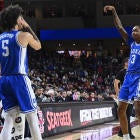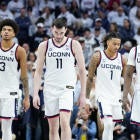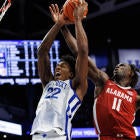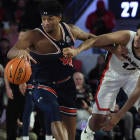When the NCAA Tournament selection committee gave us their top 16 on Saturday, they said – and we all knew anyway – that this was going to change. It didn't even take three hours.
Michigan State, which tipped off at Michigan immediately after the NCAA revealed the Spartans were a No. 4 seed, lost its third straight game, and are a No. 6 seed in the latest updated bracket projection. Three other of the committee's top 16 teams lost this weekend, and two more needed overtime to win.
Duke not only needed OT, it needed two buzzer-beaters. There is no reason to expect the level of chaos we have seen this season to change now.
Bracketology top seeds
Click here to see where your team is in Palm's latest bracket and seed list
Big Ten has 11 in bracket: Speaking of chaos, my bracket now contains 11 Big Ten teams thanks to wins by Purdue at Indiana on Saturday and Wisconsin over Ohio State on Sunday. The Boilermakers picked up their first road win of any significance, filling a hole in its tournament resume. Wisconsin's win moves the Badgers back to four games above .500 at 14-10.
That has been the traditional cutoff point for at-large bids. Only one team in the last 26 seasons has made the field with a record worse than that. Georgia was 16-14 in 2001 and had played 27 of its 30 games against teams in the top 100 of the RPI. In today's terms, that was Quadrants 1 and 2. Nobody has played a schedule anything like that since, so no team gets compared to those Bulldogs.
However, this season, it would not be surprising to see a Big Ten team squeeze in at something like 18-15 because of the depth of the league. Indiana has dropped outside of the top 50 of the NET for now, but there are still 11 Big Ten teams in the top 40, including 12-11 Minnesota.
AAC not meeting expectations: Not long ago, the American Athletic Conference looked poised to put three teams comfortably into the NCAA Tournament. Now, it is closer to being a one-bid league. In particular, Memphis and Wichita State are slumping badly.
The Shockers, who rarely lose at home, have lost five of their last seven, including to Houston and Cincinnati at home. Wichita State is now a No. 11-seed in my bracket and just outside the First Four.
Memphis is falling apart at the seams. James Wiseman quit the team rather than return from an NCAA suspension. Second leading scorer DJ Jeffries is out 4-6 weeks with a knee injury. Malcolm Dandridge sat out the loss to USF on Saturday with a knee injury as well, but he's day-to-day. During that game, Precious Achiuwa left the game with an injury late in the second half and did not return. The Tigers have fallen out of the bracket entirely and are not even among my first four out.
Cincinnati had been making a bit of a run, but that derailed in an overtime loss at UConn on Sunday.
Only Houston has been steady and comfortably in the bracket. At the rate things are going, they may be the league's lone representative.
Following the rules: There are several bracketing rules, some of which are more guidelines than rules. For example, there are guidelines regarding regular season rematches during the early part of the tournament, but there are some of those every year. The conference separation rules are more important, but might be difficult to follow with the Big Ten figuring to load almost every team into the field. I was able to follow that one for now, but we don't have conference tournament games yet.
The committee relaxed some of these rules about five years ago in an effort to avoid some of the seed swapping that went on to follow them. Seed swapping is not fair to any of the teams involved. A team that moves down gets a tougher first round game, and the team they face does as well. The opposite is true of the team that moves up. Since the committee relaxed the rules, there have been no seed swaps.
The 8-9 seeding in today's bracket put all that to the test. Houston is a host school, so cannot play in the South Regional in Houston. There are two Big 12 teams that have to be kept apart from the two other Big 12 teams that are No. 1 seeds. There are also three Big Ten teams to keep separate from each other. And finally, BYU, which cannot be bracketed to possibly play on Sunday.
Two guidelines had to be set aside to make that work. Houston and BYU are bracketed for a regular season rematch in the first round. That game would be played in St. Louis instead of Omaha which is closer for the top seed, Kansas. However, St. Louis is only about 100 miles further, so it is not that big of a deal.
If the committee would ever seed swap, it would most likely be to accommodate BYU, but in this bracket, that's not possible.
Bracketing is the easiest part of the job the committee has, but it isn't always easy.
![[object Object] Logo](https://sportshub.cbsistatic.com/i/2020/04/22/e9ceb731-8b3f-4c60-98fe-090ab66a2997/screen-shot-2020-04-22-at-11-04-56-am.png)






















